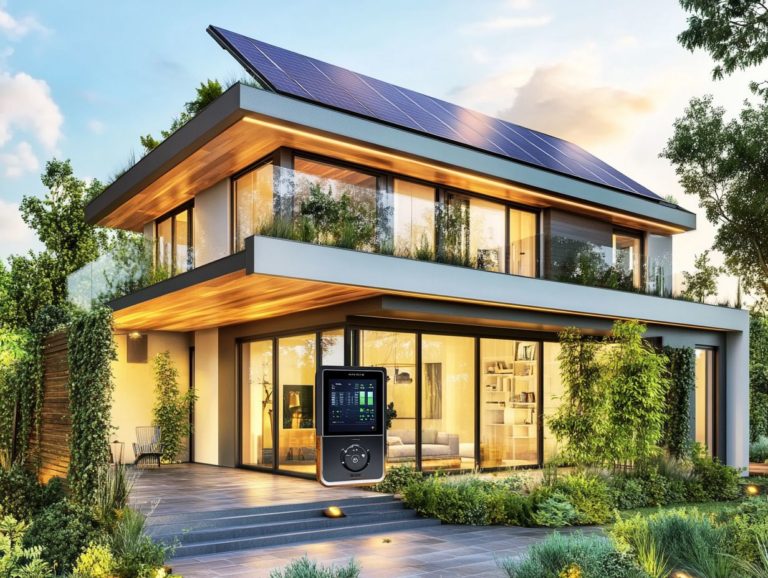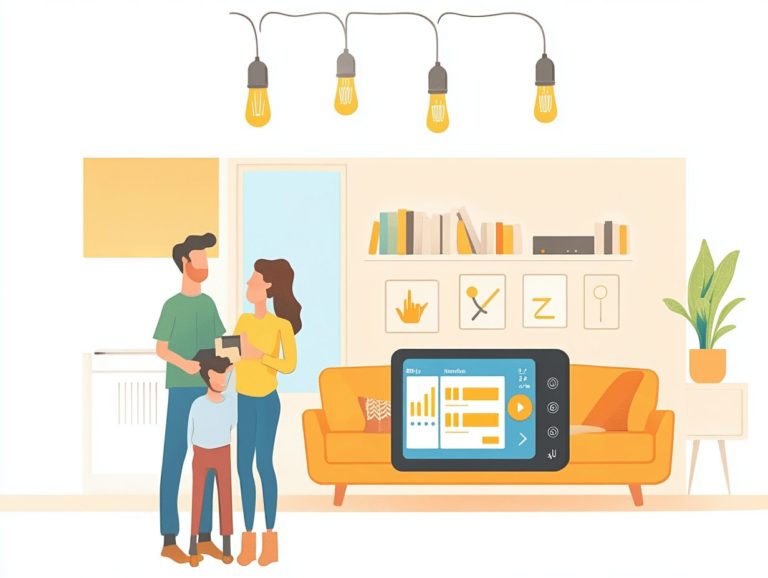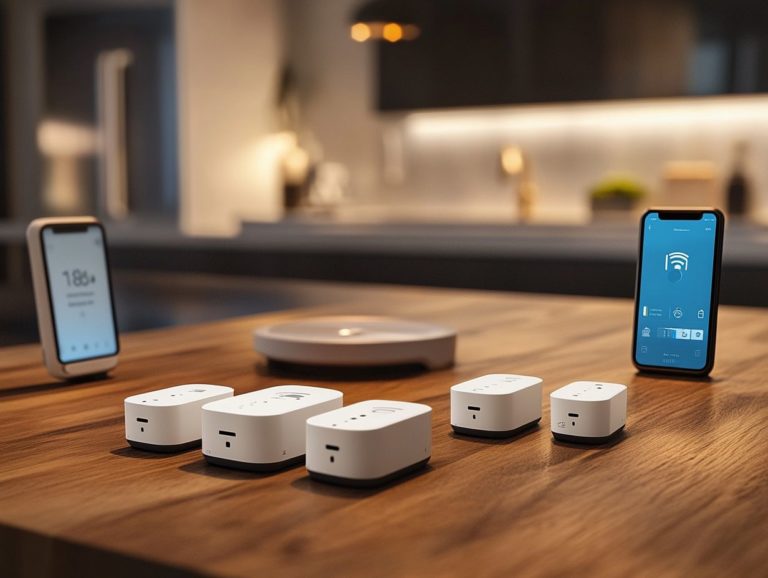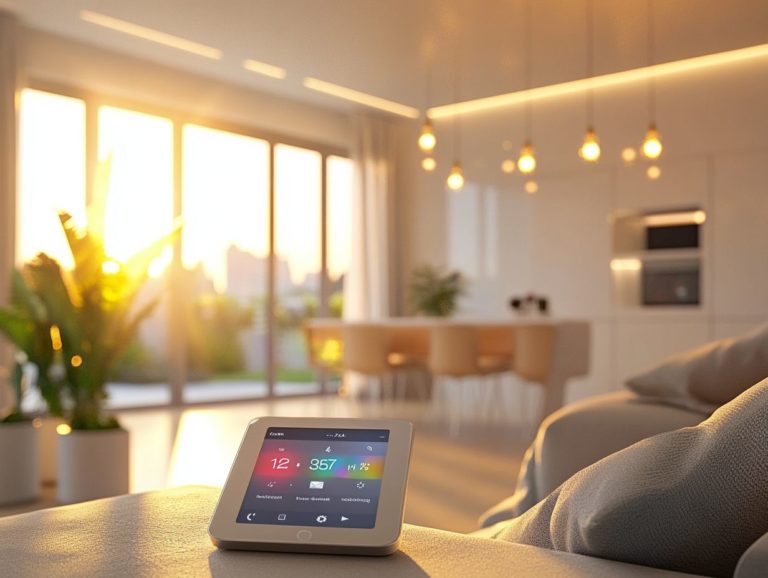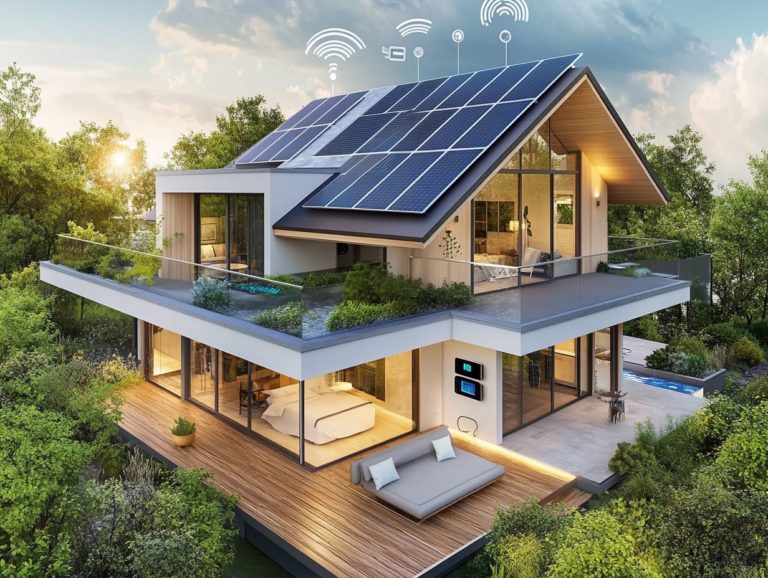5 Ways Smart Appliances Enhance Home Efficiency
Smart appliances are revolutionizing your interaction with home life, effortlessly streamlining everyday tasks, enhancing efficiency, and promoting energy management.
Discover five amazing ways these innovative devices can supercharge your home s productivity, from remote control and monitoring capabilities to impressive energy-saving features and environmental benefits.
This article also sheds light on the diverse array of smart appliances available, potential financial savings you might enjoy, and important security considerations to keep in mind.
Whether you re a tech enthusiast or simply seeking practical solutions, this guide will empower you to navigate the fascinating realm of smart home technology and solutions with confidence.
Contents
- Key Takeaways:
- 1. Remote Control and Monitoring
- 2. Energy Efficiency
- 3. Customized Settings
- 4. Maintenance and Troubleshooting
- 5. Integration with Smart Home Systems
- What Are Smart Appliances and How Do They Work?
- How Do Smart Appliances Improve Home Efficiency?
- Explore the World of Smart Appliances!
- What Are the Potential Cost Savings of Using Smart Appliances for Canadian Households?
- What Are the Security Concerns with Smart Appliances?
- How Can One Get Started with Smart Appliances and Home Automation in Their Home?
- Frequently Asked Questions
- How do smart appliances and HVAC systems enhance home efficiency?
- What are the top 5 ways smart appliances and smart home features enhance home efficiency?
- Can smart appliances and smart home solutions help reduce household waste?
- Do smart appliances and IoT devices require a lot of technical knowledge to operate?
- Do smart appliances and smart home systems require a lot of maintenance?
- Will using smart appliances and energy-efficient lighting save me money in the long run?
Key Takeaways:
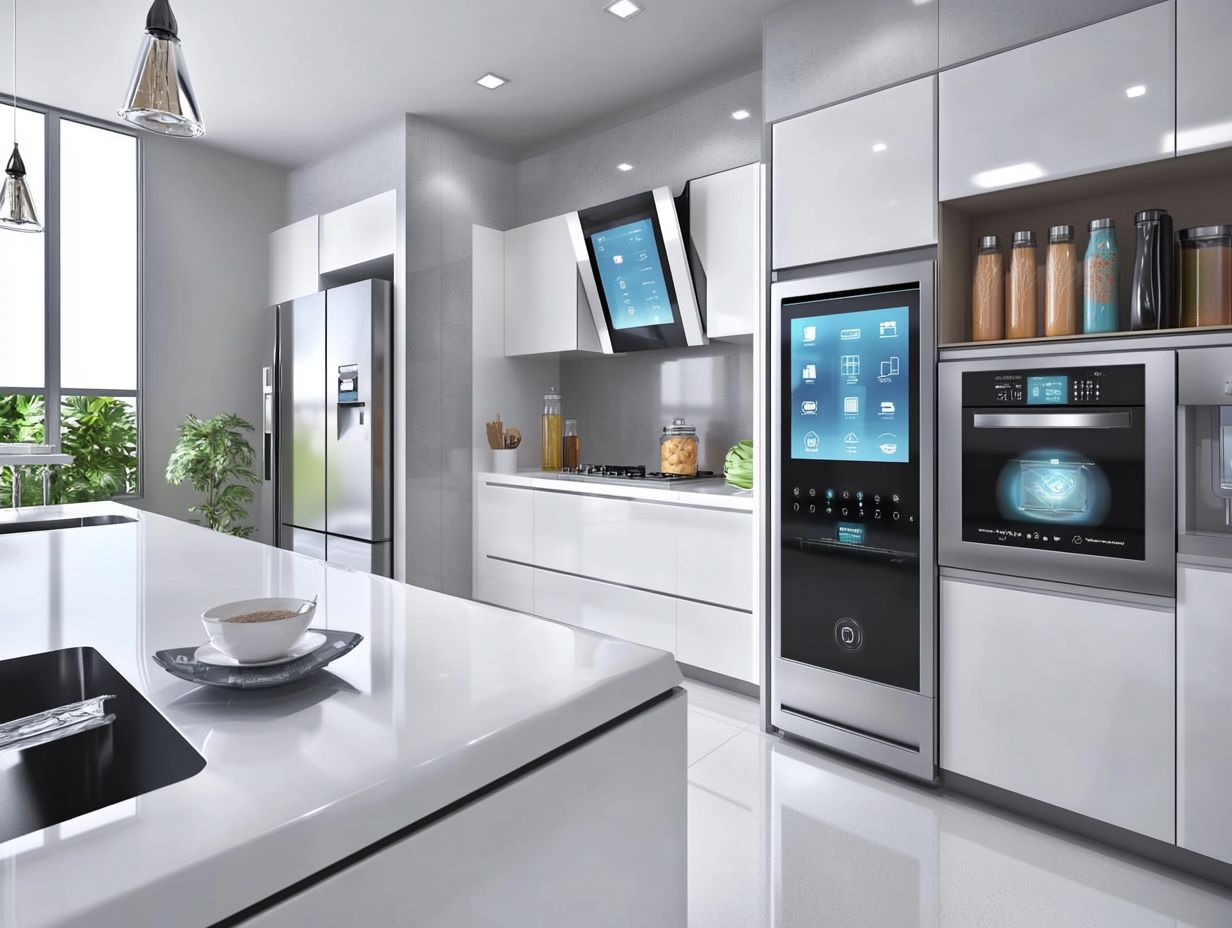
- 1. Control and monitor your appliances remotely for convenience and energy savings.
- 2. Smart appliances use advanced technology to improve energy efficiency and save you money on utility bills.
- 3. Personalize settings for your appliances to fit your lifestyle and maximize efficiency.
Don’t miss out on these benefits!
1. Remote Control and Monitoring
Remote control and monitoring have transformed how you, as an eco-friendly homeowner, manage your smart home energy systems. With the power to oversee your energy consumption and optimize usage from anywhere with internet access, you can take command like never before.
Advanced technology enables you to harness smartphone apps and smart home hubs to control a plethora of devices, including thermostats, smart plugs, and smart lighting systems. This streamlines your energy management in an effortlessly efficient manner.
By monitoring energy use in real-time, you gain instant feedback on your consumption patterns. This makes it easy to identify those pesky energy-wasting devices and adjust your habits accordingly.
For example, smart thermostats learn your schedule to optimize heating and cooling, while also allowing remote control. This means you can tweak settings even while you’re away from home.
Similarly, smart plugs empower you to switch off devices that may have been left on by accident, effectively reducing energy wasted by devices left on when not in use. Energy-efficient smart bulbs can be programmed on schedules or controlled through voice commands, further contributing to your energy savings.
These innovations underscore the value of real-time data and energy monitoring. They equip you to make informed decisions that enhance energy efficiency, lower costs, and ultimately lead to a more sustainable lifestyle.
2. Energy Efficiency
Energy efficiency stands at the forefront of smart home systems, directly influencing your savings, lowering energy costs, and curbing waste. It s essential not just for environmental stewardship but also for your financial well-being as a homeowner.
In an era where climate change looms large, embracing energy-efficient practices has never been more vital. By integrating smart appliances and Energy Star products into your home, you can play a significant role in this crucial movement.
These advanced devices are crafted to consume less energy while delivering exceptional performance, thereby promoting a culture of reduced consumption. To further elevate your energy efficiency, consider implementing these straightforward strategies:
- Utilize programmable thermostats
- Install LED lighting
- Optimize insulation
When choosing energy-efficient devices, ensure they are compatible with your existing smart home technology. This compatibility guarantees seamless integration, allowing for optimal functionality and control throughout your living space.
Start integrating smart appliances today to boost your savings and help the planet!
3. Customized Settings
Customized settings in smart home technology empower you, the climate-conscious homeowner, to tailor your energy management systems to meet your unique needs. By optimizing the use of smart thermostats, smart lighting, and various intelligent devices, you can achieve maximum comfort and efficiency in your living space.
Take, for example, automated systems that learn your daily habits. They know when you typically rise in the morning or retire for the night, adjusting heating or cooling settings to maintain the ideal temperature without wasting energy during the day.
Smart lighting also offers great benefits it can be programmed to dim or turn off automatically when no one is home, using motion sensors and schedules to reduce electricity consumption effortlessly. This enhances the advantages of smart home technology.
Incorporating real-time weather data further boosts your energy savings. If a scorching day is approaching, your smart thermostat pre-cools your home before the heat sets in, all while optimizing energy use.
By utilizing these intelligent settings, you elevate your comfort level and contribute to a more sustainable future.
4. Maintenance and Troubleshooting
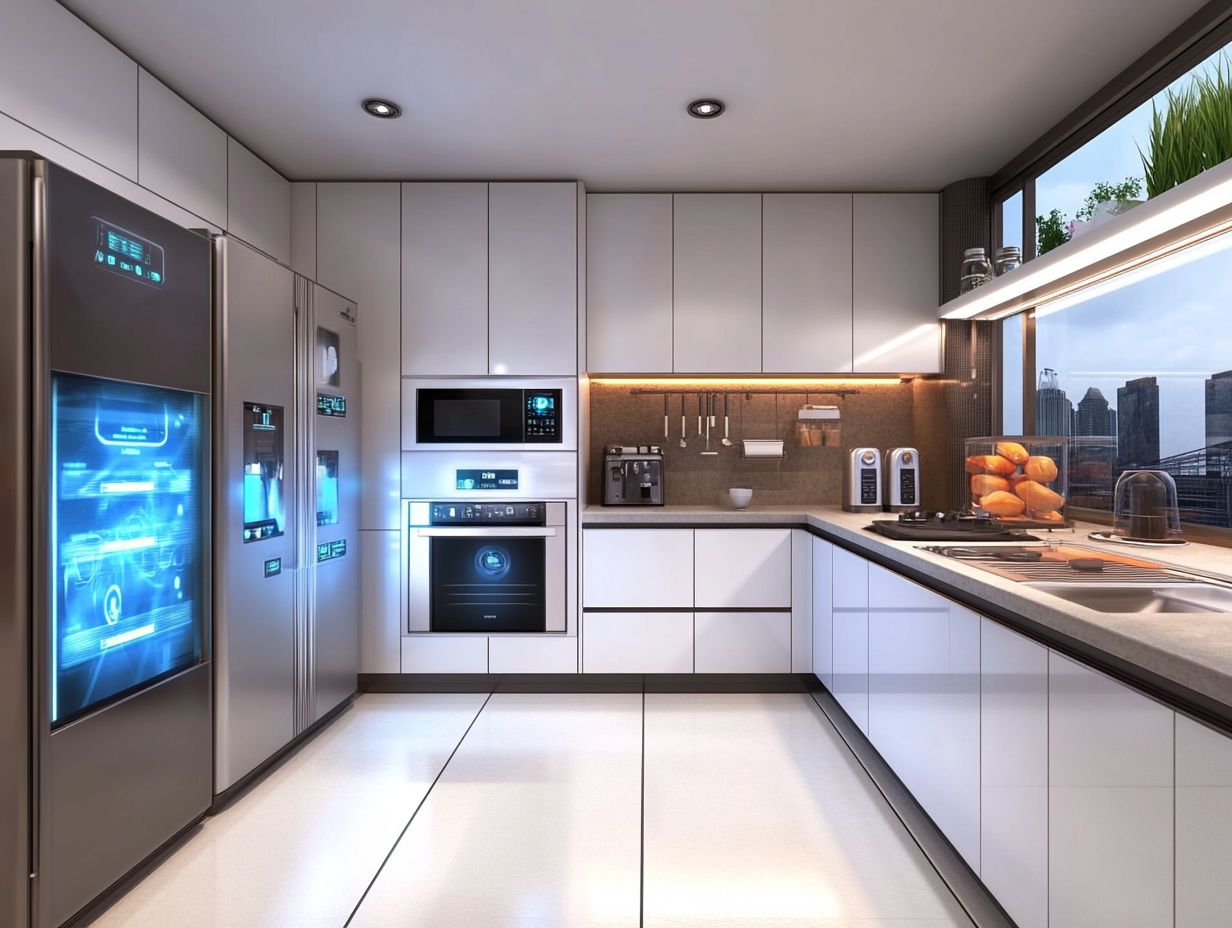
Effective maintenance and troubleshooting of your smart appliances are crucial for ensuring optimal performance within your smart home system. This directly impacts the longevity and efficiency of your energy-saving devices and features, including HVAC systems.
Regular check-ups can help you catch problems early and save you money. To achieve seamless integration of your smart home, consider conducting periodic home energy audits. This involves evaluating your energy usage patterns and identifying areas for improvement.
When faced with common challenges like connection drops or sluggish performance, you can often resolve these issues by rebooting your devices, updating firmware, or fine-tuning your network settings. It s important to monitor your smart appliances for any unusual behavior, irregular energy consumption, or software glitches. This vigilance helps maintain their efficiency and performance.
By taking a proactive approach to maintenance and troubleshooting, you can optimize your smart home experience and ensure these technologies enhance your daily living consistently.
5. Integration with Smart Home Systems
Integration with smart home systems transforms the way you manage energy in your home. It allows various smart devices like smart plugs and lighting systems to work together seamlessly, optimizing energy consumption while enhancing your convenience.
Smart devices connect using protocols like Zigbee and Z-Wave, which are communication systems that allow devices to talk to each other. For example, when your smart thermostat senses that no one is home, it can signal the smart lights to turn off, effectively cutting down on energy waste.
Additionally, smart appliances like refrigerators and washing machines are programmed to run during off-peak hours, giving you more savings on your electric bills.
By uniting these diverse IoT technologies and smart home features, you gain enhanced functionality in your household and achieve significant reductions in overall energy consumption, paving the way for a more sustainable way of living.
What Are Smart Appliances and How Do They Work?
Smart appliances represent top-notch technology, harnessing cutting-edge home technology to elevate functionality, boost energy efficiency, and grant you real-time control over energy consumption through Internet of Things (IoT) devices, automation, and connectivity features, including household energy monitoring.
These devices are meticulously crafted to integrate effortlessly with your home network. You can monitor and manage them directly from your smartphone or tablet.
Discover the convenience of remote control, smart sensors, and automatic scheduling, all designed to streamline your everyday tasks and free up your valuable time. For example, smart refrigerators can diligently track your food inventory, helping you minimize waste. Additionally, implementing energy efficiency strategies for small homes, like smart ovens that offer precise cooking instructions and adjust cooking times based on your selected recipe, can further enhance your home’s sustainability.
Even washing machines equipped with smart capabilities can optimize water usage and schedule cycles during off-peak hours to conserve energy. For those considering upgrades, following 5 tips for energy-efficient home renovation can also enhance energy management and efficiency within modern households.
How Do Smart Appliances Improve Home Efficiency?
Smart appliances elevate your home s efficiency by harnessing advanced automation technology. They optimize energy consumption, streamline household tasks, and minimize energy waste, ultimately leading to significant savings on your utility bills and promoting overall smart home benefits.
Take smart thermostats, for instance. They learn your preferences and automatically adjust heating and cooling schedules. This ensures that energy isn t wasted when your home is empty, especially useful for Canadian households aiming to manage energy usage efficiently.
Smart washers and dryers let you start and monitor cycles remotely via an app. This allows you to run laundry during off-peak hours or when energy rates are lower.
With energy monitoring features, you gain real-time insights into how much electricity your appliances are consuming. This empowers you to make informed decisions about your energy usage and further reduce costs. Including a home energy audit as part of your routine can provide additional insights and recommendations for energy management.
All these innovations lead to lower utility bills and a more eco-friendly home. They showcase the exceptional return on investment that comes from upgrading to these intelligent systems and energy efficiency hacks that promote sustainability.
Explore the World of Smart Appliances!
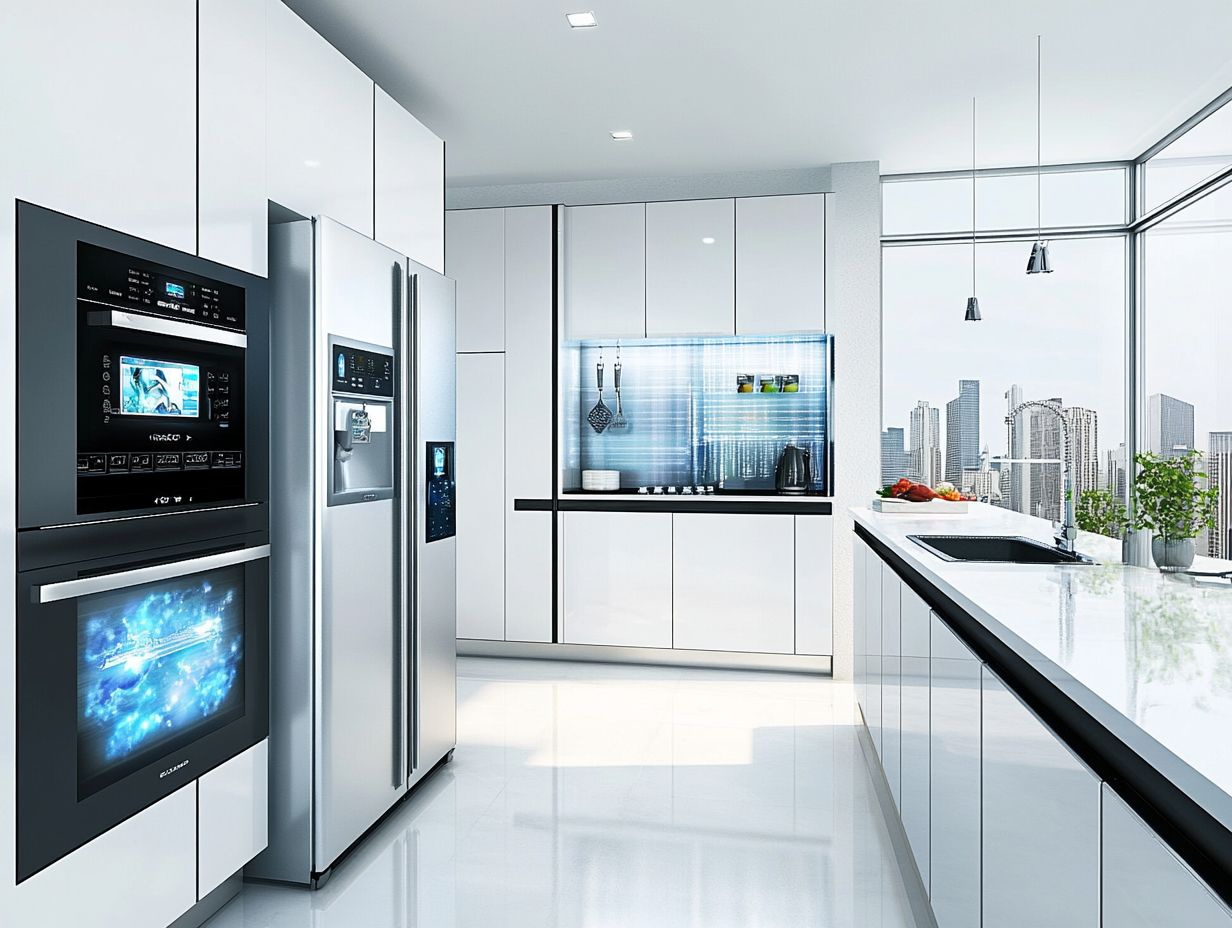
You have an impressive array of smart appliances at your fingertips today, spanning various categories like smart kitchen devices, laundry solutions, and energy-efficient gadgets designed to elevate the functionality and efficiency of your modern home.
From smart lighting systems to smart power strips, each device aims to make your life easier and more efficient. These innovative technologies not only streamline your daily tasks but also encourage smart energy management, translating to substantial cost savings for you.
Imagine a smart refrigerator equipped with built-in cameras that allow you to check your inventory right from your smartphone. This feature helps reduce food waste by ensuring nothing goes unused. Smart water detectors can alert you to leaks before they become costly issues.
Consider smart ovens that you can program remotely, delivering precise cooking temperatures and times so that your meals are perfectly ready when you are. Smart washing machines offer customizable cycles and notifications, enabling you to optimize both water and energy usage. Don’t overlook smart thermostats that learn your preferences and adjust temperatures automatically, contributing to a more sustainable lifestyle. For more tips, check out these 5 ways to improve your home’s efficiency today.
Smart sprinkler systems and smart garage door openers can further enhance the convenience and efficiency of your home. Additionally, consider implementing 5 essential energy efficiency upgrades for homes to boost your home’s performance. Explore how smart appliances can transform your home!
What Are the Potential Cost Savings of Using Smart Appliances for Canadian Households?
Engaging with smart appliances can lead to impressive cost savings. These energy-efficient devices optimize energy management and usage patterns, significantly reducing overall energy costs. Regular home energy audits can help identify further opportunities for energy savings and financial benefits.
According to a study by the American Council for an Energy-Efficient Economy, households that embrace smart appliances can enjoy savings ranging from 10% to 30% on their monthly energy bills. Take smart thermostats, for example. They adapt to daily routines, fine-tuning heating and cooling for maximum efficiency. This adaptation can potentially slash heating costs by up to 15%. With features like remote monitoring and scheduling, you can ensure that your appliances operate only when needed. For renters looking to enhance their energy savings, exploring 5 energy efficiency solutions for renters not only minimizes energy consumption but also aligns with the goals of climate-conscious homeowners.
This method delivers lasting financial benefits that extend beyond mere utility savings, contributing to environmental benefits as well.
What Are the Security Concerns with Smart Appliances?
While smart appliances bring a wealth of advantages, they also introduce significant security concerns regarding data privacy, unauthorized access, and the looming threat of cyberattacks on your connected smart home technology, which includes devices that can connect to the internet and be controlled remotely.
These devices, often connected through the internet, can become vulnerable if not adequately secured. Hackers might exploit weak passwords, outdated software, or unsecured networks to gain access to personal data and take control of your systems.
Stay alert by changing default settings, regularly updating device firmware, and adopting robust password practices. Act now to understand where your data is stored and who can access it to maintain your privacy.
By taking these proactive steps, you can cultivate a safer smart home environment that minimizes the risk of breaches and safeguards your personal information.
How Can One Get Started with Smart Appliances and Home Automation in Their Home?
Getting started with smart appliances in your home requires a thoughtful approach to your energy management goals, selecting the right energy-efficient devices, and ensuring they are properly installed and integrated with your existing smart home systems.
To embark on this journey, assess your specific needs and lifestyle preferences. Consider which appliances can truly enhance convenience or save valuable time in your daily routine. This could include smart plugs and smart lighting to improve functionality.
Next, conduct thorough research on the various smart device options available in the market. Focus on features, reliability, and user reviews to guide your decision-making. As you refine your choices, evaluating compatibility with your existing smart home technology becomes essential. Consider Energy Star products for their proven efficiency and environmental benefits.
This careful consideration will ensure seamless communication and functionality among your devices, allowing you to create a genuinely interconnected smart home environment tailored to your unique requirements. Tools like smart home hubs can facilitate this integration, offering centralized control over your IoT devices.
Frequently Asked Questions
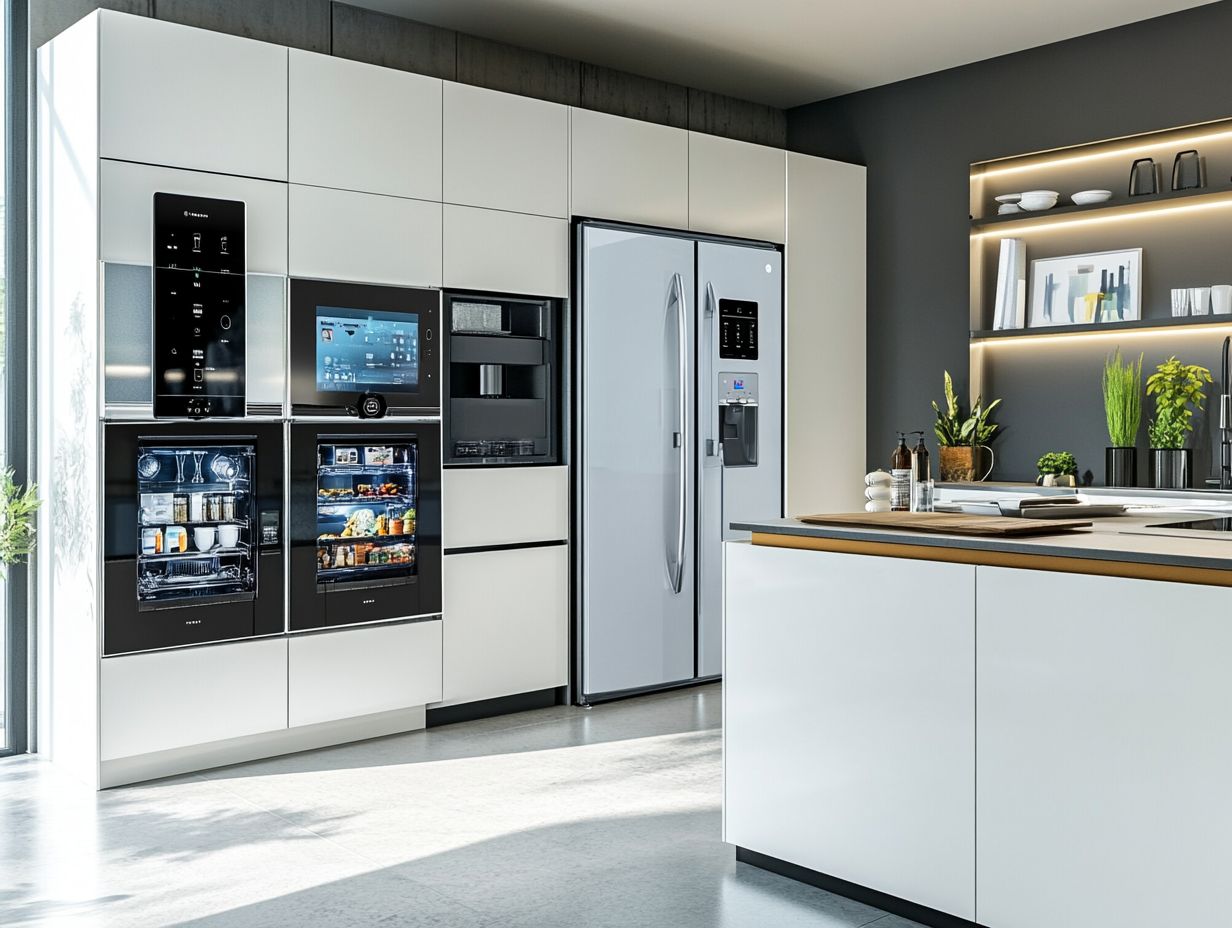
How do smart appliances and HVAC systems enhance home efficiency?
Smart appliances use advanced technology to improve energy efficiency, reduce waste, and streamline household tasks. This results in a more efficient and eco-friendly home.
What are the top 5 ways smart appliances and smart home features enhance home efficiency?
1. Energy Savings: Smart appliances adjust their energy use based on your daily routines. This leads to substantial savings on your energy bills.
2. Remote Control: You can monitor and control your home’s energy usage from anywhere. This flexibility helps you save energy and money efficiently.
3. Water Conservation: Features like load sensing and water tracking in smart appliances reduce water waste. This not only saves water but also lowers utility costs.
4. Time-Saving Features: Smart appliances automate household tasks. This saves time and energy, letting you focus on what really matters.
5. Customization: These appliances often come with customizable settings. You can tailor them to fit your specific needs, making tasks easier.
Can smart appliances and smart home solutions help reduce household waste?
Absolutely! Smart appliances can alert you when it’s time to restock groceries, which cuts down on food waste. They optimize energy and water use, promoting a sustainable lifestyle.
Using tools that track energy use lets you identify waste and take action. This helps create a more efficient home!
Do smart appliances and IoT devices require a lot of technical knowledge to operate?
No, most smart appliances are easy to use. They have user-friendly interfaces and can often be controlled via mobile apps.
Some even include voice control, making them accessible to everyone!
Do smart appliances and smart home systems require a lot of maintenance?
Not necessarily! Smart appliances are designed for low maintenance. They can often self-diagnose issues.
Regular cleaning and tasks like changing air filters are usually all that s required.
Will using smart appliances and energy-efficient lighting save me money in the long run?
Yes! Smart appliances help you save money over time. With energy and water savings, automated tasks, and remote control options, your utility bills will decrease.
Investing in Energy Star products now can lead to significant savings later!

